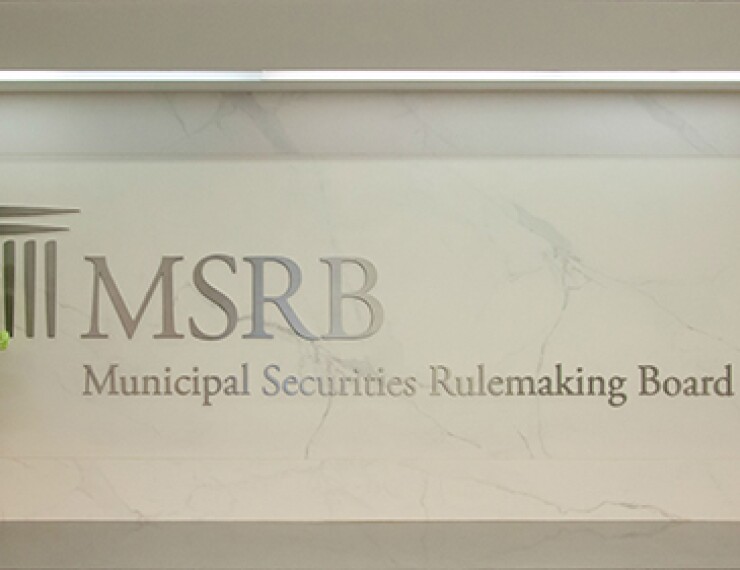
WASHINGTON – The continuing education requirements for municipal advisors that the Municipal Securities Rulemaking Board filed with the Securities and Exchange Commission make clear that firms have the flexibility to tailor required training to their specific needs.
The clarification was made in response to concerns from commenters that the proposal was vague.
The MSRB also revised the proposed regulations to allow dealer-MAs to meet their training requirements for both dealers and MAs through a single training plan after the Third Party Marketer's Association warned that the previous requirement for two separate plans would have created regulatory overlap. However, dealer-MAs would still have to do separate needs analyses for the MA and dealer components of their firms. A needs analysis refers to the documentation that shows a firm's annual evaluation and prioritization of its training needs.
The amendments to MSRB Rule G-3 on professional qualification requirements would create a "single-pronged approach" for MAs similar to one of the two prongs that dealers are currently required to satisfy with their continuing education. The changes would apply to MAs who engage in municipal advisory activities as well as those who manage, direct, or supervise the firm's municipal advisor activities and any associated persons.
MAs would have to annually complete their needs analyses, develop written training plans, and document that they provided the training to covered individuals. A plan should be developed in a way that is appropriate for the MA's business and, at a minimum, would have to cover training on applicable regulatory requirements as well as on MA fiduciary duty obligations, according to the filing.
Ohio-based Roberts Consulting LLC had asked about whether the fiduciary duty obligation training would still be required for a firm like it, which only engages with obligated person or borrower clients, not municipal entity or issuer clients. The MSRB noted that although this may be true for some firms, such a firm could at some point have to engage with a municipal entity client and thus know about the fiduciary duty obligation. However, a firm has the flexibility to determine the relative weight given to the fiduciary duty obligation during its training.
The MSRB is also proposing to amend its Rule G-8 on books and records to reflect the recordkeeping requirements the MA continuing education changes would incorporate.
MAs that commented on the MSRB's original draft of the proposal raised a number of other concerns, including the lack of clarity about what qualifies as a needs analysis, the absence of commercially available materials, the amount of time they would have to implement the changes, and the overall burden on small and single-person MAs.
The MSRB responded by clarifying that the rule "allows flexibility for developing continuing education training based on firm size, organizational structure, and scope of business activities." The board added that it plans to give MAs more guidance, including on the needs analyses, to help their understanding of the new obligations before the proposed rule change is implemented.
The MSRB said in its SEC filing that it is "supportive of a delayed implementation period" and has requested the implementation date be Jan. 1, 2018. That date gives MAs several months to "more fully digest current regulatory requirements" after the grace period for taking and passing the MSRB's professional qualification exam ends on Sept. 12 of this year, the MSRB said. MAs would have until Dec. 31, 2018 to conduct their first required annual trainings and comply with the rule.
The lack of commercially available training content for MAs would not represent an undue burden for MAs, the MSRB wrote, because the rule change "affords municipal advisors the flexibility to identify and deliver continuing education training in the most convenient and effective manner possible based on their business model."
The self-regulator said firms could use multiple training methods to achieve their end goal, including seminars, computer-based training, industry trade association materials, and educational materials from the MSRB.
The ability to source materials from several areas may also help smaller MAs limit the burden they feel when adjusting to the proposal, the MSRB said. The self-regulator noted that the proposed rule change does not require a municipal advisor to produce in-house training materials and allows firms to be flexible in recognizing there are less costly alternatives.
"Small municipal advisors and sole proprietorships with a narrowly focused municipal advisory business may find establishing a continuing education program is uniquely different and significantly less complex and narrower in scope than that of full-service firms," the MSRB said.





